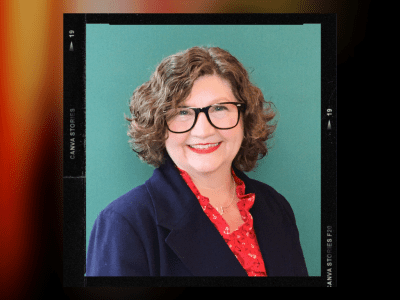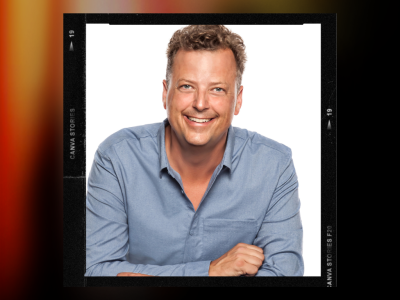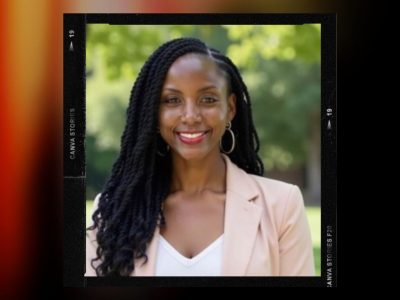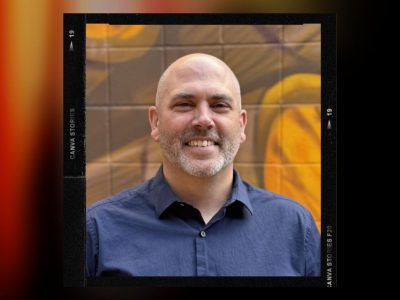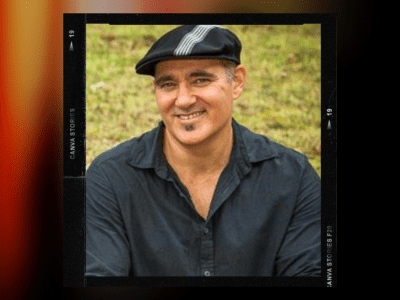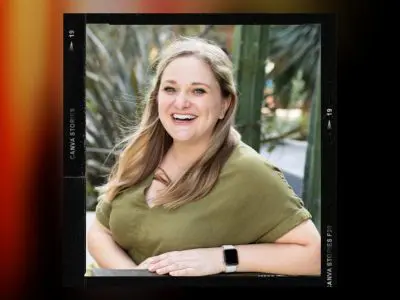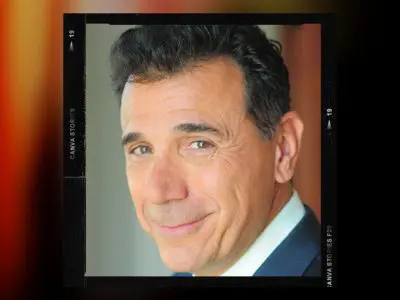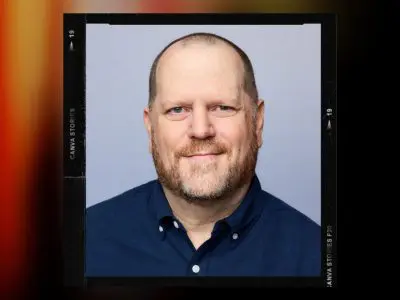Advocating for Yourself & Your Team
w/ Tania Desa
Use the buttons above to listen now.
Transcript - Advocating for Yourself & Your Team
Rich: On this episode of Team Building saves the world.
Tania: This is the way you’re supposed to be in this job, especially when you’re a junior and you’re just trying to figure things out.
Rich: It’s what’s expected of you.
Tania: Your strength and talent, it serves no one to keep it bottled inside of you that you’re owning it, you’re showcasing it for you and to help others.
Yeah. Who do you have championing you? Yeah, so I actually really wanna encourage people to almost create a personal board of directors, and I just love that Rich. Right. We are responsible for how we show up.
Rich: Hello team. It’s me, your old friend, Rich Rininland host of team building saves the world, the show where I speak to thought leaders from around the world discussing variable strategies and tools to help you and your team build a better work environment. And today, I want you to be honest with me as we discuss the benefits
of showing your authentic self in the workplace with leadership trainer and inclusion strategist Tania Desa. But first, I need to share some love with my supporters at Team Bonding. If your team is ready to experience teamwork from the Power of Play, to visit team bonding.com to learn more Now, team, join me welcoming my guest, the CEO of desa Global Leadership, Tania Desa.
Tania
hello there. Tania we wanna get this started, uh, like we usually do. Just a brief introduction of yourself for my team out there, because you had been saying in the pre-interview that you started out selling medication
Tania: Yeah. Drugs on the streets of Toronto to doctors.
Rich: Okay. That is a very specific clear, uh, delineation.
So how did you get from that to this?
Tania: Oh, okay. It was a journey, rich. So yes, I started off in pharmaceutical sales and marketing roles. I loved it. I mean, when you have to pitch ideas to doctors, busy doctors in a crowded waiting room, you have to be captivating and talk really quickly and handle a lot of rejection.
So I think, you know, I really love to build the thick skin through that, and I realized the art and magic of building relationships and storytelling, and that really carried me in my corporate career and my last corporate job. I realized when I looked around the room very often, I was the youngest, I was the only female on the management team.
Hmm. I was the only visible minority, and it was the only North American in this really pan European team. And being the only one in so many different ways, sometimes it felt heavier, a little bit lonely. Mm-hmm. And I realized that I wasn’t showing up as my best self or I wasn’t bringing all of who I really was into work every day.
And I struggled, you know, I would think I was kind of surviving versus thriving. Right. Um, and I started to think to myself, gosh, there’s gotta be a, a better way. So I started investing in roots to figure out what that better way was. I found mentors and sponsors and champions and became a professional trained coach myself, and then started putting some of those tools into action and I realized, oh my gosh, there is a blueprint.
There are systems and tools and uh, ways that we can bring more of who we really are to work and kind of give permission for others to do the same. And so I, that’s what we do now. I actually have a global business where we, we focus on leadership training and diversity and inclusion consulting to help.
You know, women, underrepresented minorities, employee resource groups bring more of all of who they are into work so that they’re getting into leadership positions and people are feeling that sense of belonging and like they’re working for really inclusive, awesome teams.
Rich: Let’s dive right into it then.
If we’re talking about people bringing out their, their truest selves when it comes to the workplace, what have they been doing in the past? Because we’ve, we’ve heard the term work persona. Or selling yourself as people from like my generation back in the day might have called it. What is that and why is that not a working strategy?
Tania: Yeah, I love that, you know, work persona. Mm-hmm. I think so many of us bring in or create and then bring in these work personas in, right? As we open the doors and walk into work or log on virtually these days in this hybrid work environment, um, we’re almost, I think of it like wearing a jacket, right?
We’re, we’re stopping at the door before we click enter into that zoom meeting and we are putting on our work persona jacket that may feel stuffy and corporatey. Sometimes that may feel like it doesn’t fit. It’s a little too tight or a little too big as this jacket we’re wearing in, and it’s a way that we cover, cover who we really are, where we hide or feel like we have to hide or cover.
Parts of who we really are. You know, that may be social parts of our identity. It may be professional parts of our identity. Maybe we don’t share that story about what we did last night at home, uh, or on the weekend. Or we don’t speak up in a meeting because we’re, we’re doing it, you know, and English is our second or third language, and we’re having to figure out everything in our head first before we speak it out loud.
Um, so there’s all these myths that have turned into beliefs that we wear as our work persona. And essentially it’s we’re showing up based on other people’s expectations. We’re trying to be everything to everyone and that can feel heavy and exhausting. And I, I, I feel like I speak from personal experience too, cause I sure, I felt like I was doing that a lot of the time.
You know, I’d open the doors to walk into work and feel like I had to be somebody else. People be who? I thought people expected me to be, instead of giving myself freedom and permission to be all of who I am, big eyes, big teeth come out at ya. You know, the enthusiasm in the morning.
Rich: I’m always reminded of that, that friends episode where Monica meets Chandler’s boss and Chandler’s constantly that horrible laugh at all of his really unfunny jokes.
That kind of nonsense.
Tania: Yeah, exactly. When, when authentically cha, you know, Chandler’s a really funny guy and you just wanna be who you are. There’s this comfort, this freedom. And what’s cool is I feel like when we can do that, people notice that like the people around us notice that and we automatically, or maybe accidentally give permission for others to be themselves too.
Rich: But what’s the benefit of being yourself? I mean, my father, when I was coming up, my father very much expected me to follow in his footsteps. I did not, and there was a whole thing there. I could do an entire series of episodes on just that. But he was always teaching me along the way, especially in the eighties.
You don’t lie on your resume, but you stretch your resume to, to near the breaking point, and then you have to wear that as you go into the workplace, and that’s how you succeed. Yes. Yeah. Why is that not working any longer or was it that it’s just hasn’t been working at all and we’re only now beginning
Tania: to realize it?
I feel like it’s that one, what you just said, you know, hasn’t been working at all and we’re beginning to realize it because let’s face it, doing that and you’re not alone, so many of us have heard that our entire lives. Right, right. Just like this is the way you’re supposed to be in this job or as part of this team working for X company, right.
Uh, at this stage in your career, especially when you’re junior and you’re just trying to figure things
Rich: out, it’s what’s expected of you.
Tania: Absolutely. It’s what’s expectable of you, but let’s face it, that can feel exhausting. It is exhausting. It is draining to try to be someone else to hide who you really are and pretend to be someone else, or pretend to be like everyone else.
And in today’s workplace, in today’s world, we don’t wanna be like everybody else. Mm. I mean, we actually have to lean into what makes us different. What is your unique value? What’s your strength? What do you do so uniquely, so differently, so incredibly that it actually sets you apart from the person sitting to beside you.
We need to focus more on that because that is actually how we are successful in today’s workplace, right? And today’s teams where we can own our strengths. And bring them to the table and be cool and be okay if they’re different than, than the people around the table. Right? Um, so there’s a place for all of
Rich: that, but why is it people are still doing this?
I mean, if we have an episode like this, it’s because it’s still out there. Is this a matter of imposter syndrome or is it fear-based? Why are people doing this?
Tania: Great question. I feel like, yeah, it is fear based. I think people, you know, it takes courage. Let’s be honest. It takes courage to bring all of who you are into work every day.
And sometimes there’s these myths that have turned into deeply rooted beliefs, right? They may be cultural, like maybe you’ve come from a culture where showcasing yourself, talking about yourself is forbidden. It feels arrogant, it feels salesy. And it just doesn’t feel like you, you know, right. Maybe it’s gender belief, maybe you’re the only female in that, on that en in the engineering team meeting or in that on the manufacturing floor and you’re trying to figure out how to be seen and heard or interrupted less.
Maybe it’s it’s life experience, right? You took a risk, it didn’t work out, and the memory of that is still lingers and, and, and so you hold yourself back. So I think there’s so many reasons. Why we hold ourselves back and we have to realize that it takes courage and vulnerability to to be all of who we are, to bring that to, to drop the work persona and own our awesomeness, and give ourselves that freedom and permission to be our true selves in so many different ways at work.
And maybe we experiment slowly. Maybe it’s in, in one team meeting or one lunch with a colleague or in a performance review. Right? Mm-hmm. Um, and then we kind of build, it’s almost like we gotta have this workout. We build that muscle, that comfort level, and then we can do it in different situations and more frequently.
Then we totally, shed almost burn that work persona jacket. And we wear our jacket, which we always had on underneath anyway. You know, and it’s bold and it’s colorful and maybe there’s lights on it. It’s, it’s all different.
Rich: We lose, we lose the shoulder pads and the yes and the box tie. Besides just comfort, what are some other benefits that individual employer or employees rather, can see confined in being their truest self?
Tania: I mean career advancement. If you are just like everyone else, what makes you different? What, what? How have you earned that, that leadership role or to be go from individual contributor to people manager, right? When you can recognize what makes you different, own your own strengths, then people know when to tap into you.
And it’s also about articulating where you wanna go next, right? I think understanding who you are. And bringing more of who you are and to work. It also gives you the courage to articulate where you wanna go next in your career. And then people will tap you on the shoulder. People will put your name in the hat for incredible opportunities that you don’t even know exist yet.
Right. So we build. School relationships. We build mentors and sponsors and advocates, and more people recognize our value, and that means career advancement, and that’s a good thing too.
Rich: Then let’s look at it from the other end. Let’s, let’s look at the employer. Why. Am I going to go, especially if I have been in my career for 20 some years, why am I looking for this?
If it, if it is new, why am I looking for that unique individual as opposed to someone I’m used to? You know, the square peg in the square hole.
Tania: Yeah. I mean, it is, it can feel comfortable. As we, as human beings, we wanna work with people we know, like, and trust. And very often those are people who look like us, who sound like us, who come from the same, you know, background as us.
Right. That’s also very limiting because we’re thinking in this homogeneous way, right? We’re thinking all the same ideas. We’ve got the same vantage point. Whereas if we can open our minds, if we as people leaders, we as HR professionals, we as team leaders, we can say, what if we had different voice at the table?
Then we get a different vantage point. We get new perspectives, maybe perspectives that are closer to what our customers are thinking and feeling, which is always a good thing because then we have better ideas and solutions, better ways to serve our customer base. Um, new product ideas, new services, um, that come out.
So there, there’s this newness, there’s innovation, there’s better ideas coming to the table. Um, and. There’s also this, uh, greater sense of belonging and inclusion. When we have different people coming to the table, it can feel sometimes a little awkward for them. So I think as team leaders, we need to be really intentional about making everyone feel comfortable at the table, ma building that psychological safety right?
And that sense of inclusion, um, because exclusion hurts. There was a cool stat I heard Rich that said, well go outside. Cool. There was a stat that I heard that said that exclusion feeling excluded, your brain processes it the same way as physical pain. Come home that feeling excluded is literally, it hurts.
Yeah. Yeah. So the opposite can be true too. You know, like when we make people feel like they belong, we invite different perspectives to the table and welcome them. Wow. It’s a great feeling. It’s that sense of community.
Rich: So let’s talk about some strategies just from an individual basis, employee to employee.
We can start right there. How can we show our, our authentic selves and allow our cubicle workmates, our, our, you know, floor partners, whoever they happen to be, to do the same back for us. Yeah.
Tania: Well, we have to know them, right? I think so often the number one question I get is, okay, Tanya, if I buy into this, oh, your awesomeness at work, you know this personal branding stuff, if you will, how do I do it?
How do I figure out? What makes me different? So I have a really interesting exercise, one that I love. I do it every year. Um, I want you and your, uh, all your viewers and Rich, maybe do you know, I invite you to do this yourself too. Sure. Um, think of 10 people in your life. Think of five people in your professional life.
You know, your boss, your colleagues, um, you know, yes, you had a great relationship with, you know, um, your mentees. And then think of five people in your personal life. Your best friend, your partner, your kids. If you’re courageous enough, you know the people in your wine club or in your CrossFit class, and send them a text or a message asking them one question.
What three words describe me best? And I guarantee you the stories, the examples, the words that come back. I mean, they’re gonna let you up. But what’s cool is that you’ll be getting the exact value that you’re bringing to your target audience. These are the people you wanna serve. These are the people you wanna impact.
So they will be articulating back to you the unique value that you bring to their lives. And. This is gonna be an incredible list, like whether you keep it as a post-it on your bathroom mirror or as the wallpaper on your smartphone. This list is gonna light you up every time you look at it. And who knows?
Maybe it’s a word cloud that you keep in your cubicle because that’s a way you remind your colleagues, your boss, your peers. Of all the unique value that you’re bringing to the team and to the company as well. Right. So imagine if we did this, you know, in team building events or at team, in team meetings.
Mm-hmm. We can actually learn more about our colleagues. We can connect with them in a new way. We know, we know how to champion them or when to tap into them based on their strengths. So I think this goes, this is an individual activity that actually becomes really cool team building or team activity.
Rich: Fantastic. Speaking of which, uh, Tania I hope you don’t mind. I do need to step away for a real quick second because you need to tell all my team out there about a company. I am very proud to be a part of Team Bonding. Team Bonding was founded over 20 years ago with one simple question, how can employees have a great time while fostering strong authentic bonds between people who work together?
No matter where your company’s located, team Bonding offers powerful, engaging, custom team building events designed to get the best out of your team anywhere in the world. They’ve created a catalog of innovative events using the power of Play as a learning tool, and tapping into the correlation of work and play.
Whether it’s scavenger hunts or jeopardy, you’re so much more the team bonding of activities be they live, virtual, or hybrid maximizes the impact of team building with an accent on fun. So visit team bonding.com to schedule your event now. Team bonding. When you want, seriously fun results, and we are back with Tania talking about your most authentic selves in the workplace, how to be your truest self, Tania, how is it that team building can actually help with this?
Like as a facilitator, what could I do to make sure that people are being their most authentic?
Tania: You know what? I love that. Create a safe environment. Create that psychological safety. So you wanna, I, I call it kind of designing a charter. I think when you get people in a room, set expectations, let’s talk about them out loud.
Like maybe it’s three things. Like, Hey, everything we talk about in the next two hours will be confidential. There’s full freedom. Everyone gets to speak and there’s no interrupting. Mm-hmm. And thirdly, uh, lots of fun. Let’s bring laughter into the room, right. Just articulating. Those expectations out loud gives people, um, that sense of freedom and it also creates alignment within the team.
And then we create this safe space where we can jump in. So I like having that, that alignment at the beginning of any team, team building, um, event or a meeting. And then, you know, invite different parts, invite that courage in and invite different parts of who you are into the meeting. So that may be recognizing that, you know, asking.
Team members around the table. What’s a role that you maybe haven’t talked about at work? Maybe it’s that you’re a dog dad, a doggy dad, or a caregiver, or you are, you know, a marathon runner. Like what’s an aspect of yourself that you maybe have never shared or talked about at work? And tell us a story from that role, wearing that jacket, creating a safe space, and then inviting people to share.
More of who they are, um, in the workplace. We get to learn more about our colleagues and our peers, like a whole new aspect of who they are. And imagine the camaraderie. Imagine, you know, the laughter, the connection that comes outta that. Plus I
Rich: imagine nowadays, especially host pandemic and, and most especially when you had most people working from home still, And people working longer, later hours than they ever had before taking on even more responsibility than they had.
It’s gotta be very hard to differentiate. That work life from your regular life.
Tania: Absolutely. And I can imagine even the people being onboarded during the pandemic, you may have never met your colleagues in person. Right, right, right. Imagine how isolating that could feel, or how much of a newbie you feel just, just, just meeting them on the screen.
So, You know, that connecting and sharing maybe even what’s behind them in the zoom, right? I think we get a window into people’s lives because of the pandemic too, seeing them on screen. So maybe we embrace that a little bit more. Like, tell us about the cat that just walked over, or the kid that popped his, you know, like it’s all okay.
And we wanna hear more.
Rich: Flipping the script a little bit, let’s talk about as, as if I were the boss, as if I were management or above. What can I do to make sure that people feel safe enough to give them that personal safety so that they can be their most authentic selves?
Tania: Uh, you have an important role as a team leader, as a manager, to be an ally, and what does that mean?
You know, an allyship, being an ally, sometimes that’s a term that’s thrown around, but we really don’t understand. We don’t know how to make it personal. What does that mean for me? How do I do that every day for my team? So I have a few ideas. Number one is things being intentional, right? Maybe it’s, it’s just noticing around the zoom boxes in the team meeting or physically in the team meeting, right?
Who’s not speaking like, who is not being seen or heard, or whose voice is on mute. Quite literally, who’s staying on mute in meetings? How can you engage them? Maybe it’s giving them a little airtime. Maybe it’s sending them the agenda for the meeting ahead of time so they can prepare a little bit more.
Maybe it’s just, you know, adding a little talking stick around so everybody gets some airtime in that meeting. How can you invite all voices to be seen and heard in a team meeting? I think being intentional about that makes a difference. Just that awareness is key, because with awareness, we have the power to choose, you know, and then, Setting expectations, you know, creating that alliance, setting the expectations and the standards to how you wanna run the meeting, how you wanna, how you want to, to interact as a team is key.
You set the tone as a leader. So deciding what’s your leadership style, how, how do you wanna feel in this meaning? And then cur curate that experience for the people around you. Sometimes that’s as easy as just articulating it out loud. That’s a fun.
Rich: And I imagine it’s, it’s more important than ever to lead by example, to make sure absolutely you are, even as the boss, showing your most authentic self to your employees.
Tania: Yes. Yeah. Share a personal story, right? Then your role modeling what that looks like. Sounds like, and it doesn’t almost have to be success stories. I feel like we’re also in the age where as leaders, we need to fail forward faster. Let’s share some failures. Let’s bring vulnerability and courage to the table, because when we can role model what that looks like, we’re also giving our team members permissions to, to feel that safety, right, and to, to bring up when they’ve made a mistake.
Or to bring up a riskier idea,
you know?
Rich: What about, um, personal branding? First off, what is, what is it? When we say personal branding, what are we even talking about?
Tania: It’s owning your awesomeness and having the courage to speak it out loud. And for a lot of people, I mean, just saying per the word, personal branding.
Ooh. I think it’s a visceral feeling in your body. You either get excited and there’s an adrenaline rush, or you’re terrified. Maybe you feel disgusted, you think, Ugh, it’s too salesy. Not for me. You know? And I really see personal branding in quite a unique way. I don’t think it’s about the I, I think it’s about the, we.
And here’s what I mean by that, rich. Yeah. Like if you have a strength or a talent that can positively impact the people around you, but you’re keeping it hidden, you’re actually stealing value from people who need it most. Hmm. It’s less about. Who you are and how you show up and more about who you can serve, how you can help, how lessons learned from a project you just wrapped up can help a colleague at the exact moment they need it.
Or how your amazing quant skills and your superpowers in that area can help a mentee, right? It, it’s when when you hide your strengths or your talents, you are limiting. The service that you can be of your community mm-hmm. People don’t know when to tap into you. Whereas if we think about personal branding as a way to help serve more people around us to make greater impact, we shift from I to we and that may make it feel a little easier, a little bit more comfortable, maybe more, more willing to experiment.
With showcasing ourselves a little bit more. So when we get those answers back from colleagues, we reach out to, you know, the three words. . Let’s own that. Let’s, let’s figure out how we can bring those strengths into more situations at work and in life.
Rich: Is it possible, though, for personal branding to simply become more workplace persona?
Is there a danger that you’re just gonna slip back into old habits?
Tania: I think it can. I, I think if you are doing it because you think it’s what you should be doing or you’re trying to do it for someone else. It’s more of a work persona thing. It’s about you for you come from this genuine place of recognizing that.
Your strength and talent, it serves no one to keep it bottled inside of you that you are owning it, you’re showcasing it for you, and to help others. So it’s coming from this genuine place because that feels different and the way that it comes out of you will be perceived different. Right. It’s authentic and then when you own it, you’re gonna go further faster in your career too.
There’s no doubt about it.
Rich: You talked about the fact that you focus a lot on inclusivity and, and diversity, which must be so monumentally important, especially with this topic is concerned because the more different you are literally that melting pot your company can be. Uh, do you have any examples of like, well, first of all, let’s talk about how important that is for the inclusivity part.
And do you have any examples of when it, you’ve seen it work really well?
Tania: Yeah, I think, you know, you know, going back to what we said earlier about wanting to see, wanting to hear all voices at the table, right? We know that when we can invite all the different voices to the table, we get new ideas, new perspectives.
Innovation is better. We have so much data to show that the ROI from diversity, equity, inclusion is there. It, there’s no doubt about it. You know, there, there’s return on investment. We get better results, uh, better products, better services for our customers, but we also feel like we are included more. And, and a lot of the companies we work with have, um, employee resource groups.
So that is when groups of employees who share a trait, maybe it’s women at Google or you know, um, African American colleagues or Latinx colleague, and they share a trait. And they feel there’s more, they are more of a minority within their company or the work culture. They come together and very often they come together to increase representation within their company, but also to for professional development, for leaning on each other, to to talk about the challenges that are keeping them up at night and find solutions and ways to move forward.
So you are asking for a success story. I think employee resource groups are incredible. Um, employee driven groups that are game changing in organizations. They help move the needle and change the, the representation at all levels of organization, but they’re also invite people to be allies, to be, to learn more about some of the challenges that exist that may be hidden or, um, that some of us who are the majority don’t really understand, like we create empathy.
We can hear stories and, and understand different people’s perspectives more, and then we are able to, to grow together. So I think investing in employee resource groups, you know, whether you’re, you are representative of the employee resource group or you’re, you know, an older white male, then you’re an ally.
Be curious. Be curious, attend those group meetings, attend those events. Um, see how, how your perspective, how you can yield your power and privilege to help somebody else. And I think as people, managers, when we recognize, we come in with power and privilege just by our title, you know, how are you using your power and privilege?
To help somebody who maybe feels like they’re on mute or they’re invisible, or you see something, you see something in them that they don’t see in themselves yet, how do you give them that nudge in the ribs to go for it? Whether that’s a new role or taking on a leadership role. Right. Um, so we all have a role to play.
Rich: What about generationally? I imagine, and I could be completely wrong in saying this, but I imagine that your millennials and your Gen Zs coming into the marketplace now are going to be. A little more used to coming at the world this way. But then again, when I think about it, cuz I’m, I’m the father of, of a teenage daughter who is very soon going to be going into college and she still doesn’t know who she fully is.
So she doesn’t know how to promote herself as her true awesomeness.
Tania: Oh yeah. Well, I hope you’ll ask her for, give her three words. Right.
Rich: That’s what I’m gonna, I will do that. I will actually do that. Thank you. But do we find that this is a boundary for generations? Because as I said, I’m coming from the generation that thought, Nope, we have to wear the persona.
We have to be what they want us to be.
Tania: Yeah, I feel like it’s actually a common challenge, whatever generation you’re at. Okay. We just don’t realize that about each other. So very often I find people coming into the workplace like your daughter, right? They’ll think, oh my gosh, I feel like I don’t really know.
My unique value, who am I to speak up in this team meeting? I’m brand new there. There’s doubt, there’s self-doubt. There’s maybe imposter syndrome that creeps in being the newbie in the room. But at the same, the other side of the table, I, we work with a ton of very senior level executives, okay. Who also have the same imposter syndrome.
It’s just years later. So, you know, it never ceases to amaze me how imposter syndrome can infect. Generations. Whether you’re millennial and just coming into the workforce or have been in the workforce for 30 years, there is self-doubt. There’s imposter syndrome. So why don’t we work together to, to share, to, to, to appreciate, to acknowledge each other more, right?
In order to remind both sides of the table that you are there, you have earned the right to sit in that seat. We value your new perspective being a millennial, and we also value your years of advice and you know, views right from being 30 years in the workforce. Like there’s room for everyone’s ideas and perspectives and vantage points, and wouldn’t the conversation be richer?
We gave ourselves permission to bring all of that in. Right, exactly.
Rich: So as an employee, how can someone like me stand up for myself and say, I want to see more of this.
Tania: Yeah, it can feel lonely thinking you have to do it all on your own. Right. And I, gosh, I got that when, when I was in my last corporate job, I thought, oh, I’ve gotta be my best advocate.
And then I’ve gotta convince my boss to be my best advocate too. Yep. So it’s just, you know, me and him, but I was wrong actually. I feel like we have to diversify if your boss is your only advocate. That’s, that’s, it’s too risky a situation your boss leaves, and then who do you have championing you? Yeah, well, I actually really wanna encourage people to almost create a personal board of directors.
Think about mentees, peers, mentors, sponsors, you know, champions, people who don’t work in your direct line on your business line. Think of people who you have lunch with. How can you share more stories about what you’re doing? Great case studies, success stories. Give people the talking points so that they can champion you in rooms that you are not in yet.
And we want those voices to sound different. We want them to be across functions, across levels, you know, across geographies. So build a personal board of directors. Think about who you want, talking about you. Then give them the stories. So that they can,
Rich: so is this something I need management to do, or is this something I can even just start doing in my every day?
Tania: Do it in your every day. Don’t wait for HR to, to, to tap you on the shoulder to build a program, a mentorship program for you. Think about who you wanna have a coffee with, you know, and in our hybrid working environment, maybe that’s a virtual one-on-one, maybe that’s a WhatsApp chat. Maybe that’s, uh, you know, walking around the block if we’re, we wanna get some exercise, do something different, right?
Um, but think about even just three people you wanna connect with in the next quarter. And then reach out to them, start to build those strategic relationships. It’s kind of virtual or live networking, um, but you’re building social capital. Because relationships take time, let’s be honest. Right? Right. Like we have to invest in getting to know people.
They have to know you. If they’re gonna champion you, they’re gonna put their own skin in the game, their own social capital on the line to champion for you. They have to get to know you. And that may take time. It may not have to win three days, maybe it’ll happen within three months or three years. So you wanna start investing Yeah.
In building those relationships today.
Rich: Plus, when you’re doing it that way, you’re looking at the difference of one program success to actual professional relationships.
Tania: Right, exactly. You’re building your network. Can you do that on LinkedIn? You can do that live. There’s so many different ways today too.
Um, and yeah, you’ll have them for life. Whether you change teams or companies or careers altogether, you will have people who have really interesting stories about you. You can talk about you at, you know, parties and on LinkedIn or give you testimonial recommendations, and that’s always a good thing.
Rich: What about that one person?
Cuz there’s always going to be that one person in my team, in my group, whatever it happens to be, who just can’t seem to get past their own fear. They, they might be looking at their job as just a, this is my paycheck, I do my 40 and I’m done for the week. And then the people who know me, I’ll go be my best authentic self with them.
How can I help them to break themselves outta that shell just a little bit more. Mm.
Tania: Yeah. Maybe tougher. Right? Right. Um, I think again, it’s role modeling and seeing it, but if you, it’s also okay. I think it’s also okay to give people, um, the permission. Like some people just want a job and they want Yeah.
It’s who they’re at work, they’re comfortable. And they’re very intentional, but they want to have a work for persona. Right. That’s actually, it’s very intentional. This is who I wanna be at work and I wanna have that exhale and, and enjoy my family time or my personal life. I want it to keep it separate.
It sounds like that is very intentional and if that is intentional, you know, respect. Sure. You get that. You have freedom of permission to do that too. I think it’s when we’re unaware. That we’re putting on a work persona and we’re just going into work and we’re feeling exhausted and drained. We have to realize that it’s because we’re covering, so they’re, we’re feeling the negative consequences.
That’s when we know, Hey, our work persona just isn’t cutting it. It’s not working for us. We need to burn this jacket. Get rid of the shoulder pads. Get rid of this jacket. Right.
Rich: Is burnout the only negative effect we can expect to see, or of having that persona? Or are there other things we can look for?
Because I’m sure there are people out there who just don’t even realize they’re doing it
Tania: right? Yeah. So burnout is probably number one. Like that feeling of that feeling, that brained feeling. Um, you may feel stuck, feeling stuck in your career, wondering, oh my gosh, I’m still in this role. When am I gonna make it to the next level?
Why can’t people see me? Maybe it’s because you’re not seeing yourself. There’s aspects that you’re not bringing in. You’re, you’re, you’re hiding some of your awesomeness, your talents, your strengths, and you need to uncover, there’s this opportunity to come off mute to take a risk. So it could be the lack of career progression.
That’s another clue that you, you, you have a work persona. Feeling isolated from their colleagues, from the company, from the mission, from the purpose. That’s another signal that, hey, maybe you’ve got a work persona in and then just a lack of enthusiasm and maybe you feel like the work that you’re doing doesn’t really matter or that you’re not being a hundred percent, the ideas that you’re bringing in feel kind of luke warm.
I think we know what that feels like. We know when that shows up. So that’s another kind of red flag that, hey, maybe I’ve got a work persona on here that I need to shed.
Rich: Because I’m constantly getting, whenever I go in, and especially when I’m doing live events, I’ll have, uh, the client contact, the person who set all this up for us, who will come to me and they will say to me, you know, can we get a list of people who just aren’t participating?
And of course, it’s my job to make sure that those people feel that they can, in whatever way that they’re, they’re going to. So I have to give them a safest space to play with everyone else as they need to give each other’s space to play together.
Tania: Absolutely. And we have to recognize there’s only so much we can do as facilitate.
Right, right, right. As leaders too, as HR leaders, as team leaders, like we can create a psychological safety, the feeling of inclusion. We can set, create the environment, but at the end of the day, we’re also putting out an invitation. We’re putting out an invitation for each and every person around the table to take accountability for how they show up.
There’s this awesome quote, think of, I heard it from Oprah. Please be responsible for the energy that you bring into this space. And I just love that rich, right? Because we are responsible for how we show up. We’re responsible for the energy that we bring in, that our level of participation, everything. We own that.
So there’s this feeling, there’s this calling forth, right? There’s this invitation to be who you are, to show up, to engage, and I think we each need to own that too.
Rich: Tania fantastic. I think we can always, if I have every episode and on an Oprah quote, that’s just the perfect way to go. Thank you so much.
Thank you for coming on and sharing your expertise with us on this and, and just your knowledge of this. It, it’s so helpful. Thank you.
Tania: Oh, this is so much fun. Thank you, rich.
Rich: Is there anywhere my people can go to learn more about you? Or Cuz I know you’re on a bunch of Ted Talks and other podcasts, but is there any place that you can direct them that they can learn more about you or how they can reach out to you if they feel that you can help their company?
Tania: Absolutely. Uh, feel free. Our, our TEDx Talk is on our website, uh, Desa global leadership.com. You can reach out to me on LinkedIn, Tania Desa, and at Desa Global Leadership is our handle. Uh, and please feel free to reach out to our team team@dessagloballeadership.com. Love, we’re always love to swap learnings and stories and offer value any way we can.
Rich: Fantastic. Thank you. And team, please give a big round of applause one more time for Tania.
Tania did you have a good time? I did have an awesome time. Oh, I hope so. I hope you enjoyed yourself and I, I hope you continue to enjoy yourself cuz we’re gonna learn a little bit more about the real you. It’s time from a speed round.
Speed. Speed, speed. All right. Now Tania, I described this a little bit to you in the beginning. What’s gonna wind up happening is for about 60 seconds, you’re gonna hear some music. That music is just helping me keep track of time. As we play the game and the game, of course, is for me to ask you a series of completely innocuous questions, and you’re just gonna gimme the first answer that comes off the top of your head, the specific point of the game.
Try to answer as many questions as you can in the time limit that we have. You feeling ready?
Tania: All right, let’s do this.
Rich: This is all for fun, but if you’re feeling it all competitive, we’re looking to see if you can beat 13.
Tania: Ooh. Okay. That’s a lot of questions.
Rich: Okay. Let’s do it together. Ready? Ready? Soon as you hear the music.
I’ll ask the first question where we go. What’s your name?
Tania: Tania Desa.
Rich: How many kids do you have?
Tania: Three.
Rich: Which one’s your favorite?
Tania: Oh, to them that are all my favorites.
Rich: Uh, do you have any pets?
Tania: No.
Rich: Okay. Name your favorite celebrity.
Tania: Oh, Oprah Winfrey
Rich: excellent. Uh, what’s your favorite toy growing up?
Tania: Oh, camera splash.
Chase
Rich: name, give me three words that best describe you.
Tania: Oh, enthusiastic, determined, and passionate.
Rich: Uh, what do you think is the right age to get married
Tania: At any age you feel totally ready.
Rich: Uh, tell me about a paper you’ve written you’re most proud of.
Tania: Paper. Oh my gosh. Um, ooh, entrepreneurial. When I was 15, they did entrepreneurial paper on Frank.
Rich: What would you do if you were invisible for a day?
Tania: Oh gosh. I would sit in on every meeting I could. And with very
Rich: important, people.
Fantastic. Tanya 11. You got 11. That’s a great job. Well done indeed. Did you enjoy yourself?
Tania: That was fun, rich. Yeah.
Rich: Thank you. Thank you very much. And again, thank you so much for coming on board and sharing this very important topic with us.
And as for you out there, my team. That’s it. We are wrapping up yet another episode of Team Building Saves the World. If you’ve enjoyed this episode, whether you’re new to the podcast or an old fan of the show, please be sure to share with everyone you know, whether they’re your coworker, your friend or family member.
It helps us to share all of this vital information. You can also find out everything about us, including all past episodes@teambonding.com slash podcast. You can also find us wherever you find your favorite podcast, Google Podcast, apple Podcast, Spotify. Wherever you go to listen, we will be there and if we’re not there, I want you to go find us on all the social medias at Team Bond Podcast.
Leave us a message telling me where you are listening, that I’m not because I want to be there. Plus, while you’re there on the social medias, go ahead, drop us alike. Let us know what you liked about the show, what you didn’t like about the show. Were give us an idea for future topic on the podcast. This is how you become a vital part of our team.
We want to hear from you. So before we say our final farewells for this episode of Team Building saves the world. Never forget, friends, that if you are within the sound of my voice, you’re on my team now and I am forever going to be on yours z. Long team, and I’ll see you next time.
It’s been
said that you learn more about a person in an hour of play than in a year of conversation, so why not put your coworkers to play with the help of the team at Team Bonding? Team Bonding was founded over 20 years ago with one simple question, how can employees have a great time while fostering strong authentic bonds between people who work together?
Their catalog of innovative events include scavenger hunts, jeopardy, and much more. Each activity, whether live. Virtual or hybrid maximizes the impact of team building with an accent on fun. Visit team bonding.com to schedule your event now. Team bonding when you want.
Seriously, fun results.
April 25, 2023
On this episode of Team Building Saves the World, Rich speaks with international leadership trainer and consultant Tania Desa about the importance of advocating for yourself and your team in and out of the workplace. They explore the challenges individuals may face when showcasing their authentic selves and strategies for building a strong personal brand. In addition, Tania provides practical tips for building a positive team culture, which includes fostering open communication, trust, and a sense of belonging. She emphasizes the significance of creating a safe space where team members can express their ideas and opinions without fear of judgement or rejection.
Tune in to discover how being an advocate for yourself can benefit you and your team.
About Tania Desa:
Tania draws from intercultural experiences of travelling to over 80 countries including studying and working in Australia, Japan, Hungary, Spain, China and Switzerland. She is a professionally trained coach from The Coaches Training Institute. She holds an International MBA from Top 25 MBA school ESADE in Spain and Peking University in China.
Tania has thrived in corporate sales and marketing management roles at Pfizer, GlaxoSmithKline, Medtronic, Ecolab, Johnson & Johnson and has led strategic discussions at the World Health Organization in Switzerland. She also leads an Employee Resource Group Leadership Council whereby Fortune 500 companies engage in quarterly diversity roundtables in Toronto. She likes to bring personal stories and best practices into keynotes, trainings, program development and every client consultation. After all, sharing is caring.
Visit our blog to learn more about the importance of authenticity at work.
" We're also in the age where as leaders, we need to fail forward faster. Let's share some failures. Let's bring vulnerability and courage to the table because when we can role model what that looks like, we're also giving our team members permission to feel that safety, and to bring up when they've made a mistake or bring up a riskier idea. "- Tania Desa
Get more human resources and leadership advice.
Less drama? Greater teamwork and job satisfaction? TeamBonding is here to help you build a stronger and happier team. Subscribe to get our team building podcast and thought leadership blogs sent straight to your inbox.








